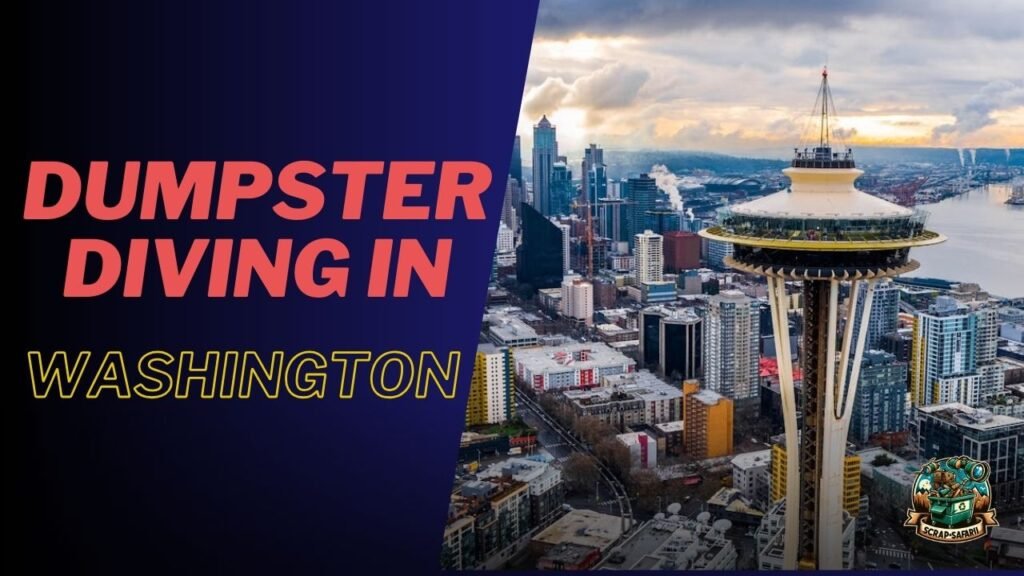Dumpster diving involves rummaging through commercial or residential trash containers to find discarded items that can be reused, repurposed, or resold. This practice of scavenging for valuables has been around for decades but has gained popularity in recent years.
Dumpster diving takes place in big cities and small towns across America. It brings up questions about legality, sanitation, ethics, and more. The laws and norms around diving vary based on your location. In some areas, trash containers are fair game, while other cities have banned the practice. Safety and cleanliness remain top concerns. Despite the challenges, dumpster diving has its devout practitioners who stick with it for the thrill of the hunt and the chance to live more sustainably.
Is Dumpster Diving Illegal in Washington?
In Washington, dumpster diving is generally legal as long as certain conditions are met. Specifically, a person must have permission to be on private property and cannot trespass to access a dumpster. Additionally, once an item is discarded in the trash receptacle, there is no expectation of privacy and the item is considered abandoned property that anyone can legally take.
However, laws against trespassing make it illegal to enter private property without permission. So dumpster diving is only legal if the dumpster is on public property (like a public street) or if the owner grants permission to be on their private property. Dumpster diving at businesses is usually prohibited without consent.
Additionally, local ordinances may regulate or prohibit digging through waste containers in some areas. Some cities have passed specific bans on dumpster diving. So it’s important to check any relevant local laws.
Washington’s laws allow taking discarded property but prohibit trespassing. As long as those conditions are met, dumpster diving itself is generally legal in the state. But always seek permission when on private property and check local regulations.
Exceptions to Illegality
Though dumpster diving is largely illegal in Washington, there are some exceptions worth noting.
Dumpster diving is legal on public property, as there is no reasonable expectation of privacy in public spaces. This means diving in dumpsters on public streets, parks, beaches, etc does not violate trespass or privacy laws. However, local ordinances may restrict digging through trash receptacles in public areas, so check your local regulations.
Implied consent is another exception. If a business has a policy allowing dumpster diving or communicates permission to search their dumpsters, there is no illegality. Some stores deliberately place unspoiled food or lightly damaged goods near dumpsters for people to take. Be aware that consent can be withdrawn at any time.
While diving itself is prohibited, there are no laws against picking up discarded items left beside dumpsters, as that is considered public space. Focusing efforts on finding valuables left next to dumpsters, rather than inside them, can be a legal alternative.
The law is mainly concerned with trespass on private property and invasion of privacy. As long as divers take care to avoid those specific violations, dumpster diving remains a legal gray area in many cases. Understanding and respecting the intent behind anti-dumpster diving laws can help divers stay on the right side of the law.
Is Dumpster Diving at Night Illegal in Washington?
Dumpster diving at night brings up concerns about trespassing and violating curfews or loitering laws. In Washington state, there are no blanket curfews, though some municipalities like Seattle do have youth curfews in effect. Generally, dumpster diving at night is not explicitly illegal.
However, nighttime dumpster diving does carry risks. Businesses are closed at night, so someone dumpster diving could potentially be arrested by police for trespassing, burglary, or unlawful entry depending on the circumstances. While dumpster diving itself is not illegal, entering private property without permission is trespassing. So dumpster diving behind a business at night when they are closed could lead to trespassing charges.
To avoid potential trespassing issues, it is best to dumpster dive during daytime business hours (with permission when possible). If diving at night, steer clear of areas marked private property or no trespassing. Avoid hiding, forced entry, or using any tools to gain entry, as those actions could lead to burglary or other charges. Overall, exercise caution when scavenging at night to avoid activities that could be construed as criminal.
Best Places to Dumpster Dive in Washington
Some of the best cities and areas for dumpster diving in Washington include:
Seattle
Seattle has a high density of retail stores, restaurants, universities like the University of Washington, and tech company campuses like Amazon and Microsoft. This makes it a prime area for finding discarded food, consumer goods, electronics, and more. The dense urban environment means you can walk or bike between dumpsters efficiently. Good neighborhoods to focus on are the University District, Downtown, Capitol Hill, Ballard, and Fremont.
Spokane
As Washington’s second largest city, Spokane offers many dumpster diving opportunities. Check downtown near Riverfront Park, universities like Gonzaga and Whitworth, as well as strip malls throughout the city. Focus on areas like Browne’s Addition, Lincoln Heights, and Garland District.
Tacoma
Tacoma has over 200 restaurants, making it a target-rich area for edible dumpster dive finds. Also check dumpsters by the Tacoma Dome, Point Ruston retail area, and the University of Washington Tacoma. Focus your efforts on neighborhoods like 6th Ave, North Slope, and Proctor District.
Vancouver
Located just across the river from Portland, Vancouver provides access to big box retailer discard piles and food waste. Check downtown and Jantzen Beach Supercenter. Mall 205 and surrounding restaurants are other hot spots.
Olympia
As the capital of Washington, Olympia offers opportunities to salvage discarded goods. Target areas like Downtown and Capitol Way, then expand outwards towards strip malls and grocery stores. Check around the Evergreen State College campus as well.
Bellevue
Home to several Fortune 500 company headquarters and a large mall, Bellevue promises profitable dumpster diving. Focus your search on the Downtown Park district, Factoria neighborhood, and Crossroads Shopping Center.
With some exploration, those willing to dumpster dive can find overlooked treasures in Washington’s urban centers. Just remember to dive ethically and safely.
Safety Tips For Dumpster Diving In Washington
Dumpster diving can be an exciting urban adventure, but it does come with some risks. Here are some tips to dive safely:
- Wear thick gloves to protect your hands from sharp objects. Dumpsters can contain broken glass, rusty metals, and even needles from medical waste. Thick rubber gloves will help prevent cuts and keep you safe from infections.
- Keep an eye out for hypodermic needles. If you see any, use extreme caution. Consider bringing along a pair of tongs or pliers to safely pick up and dispose of any needles you encounter.
- Never go dumpster diving alone. Bring along at least one friend. There is safety in numbers, and your dive partner can act as a lookout and help you navigate any dangerous objects in the dumpster.
- Choose dumpsters in safe, well-lit areas. Avoid diving at night in dark or isolated areas. Only dive during daylight hours when you can see your surroundings.
- Bring a flashlight. It will help you see inside dumpsters more clearly to identify any hazards or valuable items.
- Use common sense. If you encounter any threatening situation, do not continue dumpster diving there. Listen to your instincts and stay safe.
By taking some basic precautions, you can turn dumpster diving into an enjoyable and rewarding experience. Just remember to watch for sharp objects, dive in pairs, and use good judgment. With some common sense, dumpster diving can be safe and profitable.
What to Expect to Find
When dumpster diving in Washington, there are a variety of potentially valuable items you may uncover. Here are some of the most common:
Food
Grocery stores, restaurants, bakeries, and cafes will often throw out food that is still edible but close to expiration dates. This can include produce, bread, pastries, packaged foods, cans, and more. Always inspect food to make sure it is still fresh and safe to eat.
Furniture
Big box furniture stores will frequently toss display models, floor models, or returned furniture that is still in good shape. With a little cleaning or minor repairs, these pieces can be given a second life. Diving behind furniture stores is a great place to find chairs, tables, mattresses, and more.
Electronics
Technology and electronics have rapid upgrade cycles, so stores often dispose of older models in favor of new inventory. Computers, TVs, stereos, phones, and small appliances can potentially be refurbished. Make sure to check the functionality.
Dumpster diving requires patience and persistence, but with some luck, you can find amazing free items with monetary value or usefulness around the home. Always use caution and common sense when dumpster diving.
Most Valuable Finds
Dumpster diving can turn up some surprisingly valuable items that can be cleaned up and resold for profit. Electronics in particular can net dumpster divers their biggest scores. Smartphones, laptops, tablets, game consoles, and other electronics are frequently tossed after minor issues or cosmetic damage. With some repairs, cleaning, and refurbishing, these can often be restored to full working order and sold for hundreds of dollars online or at pawn shops.
Jewelry is another lucrative find, even if broken or missing stones. Precious metals can be scrapped or recycled. Rare coins, vintage video games, musical instruments, power tools, bicycles, and collectibles are also worthwhile grabs. Divers may luck upon discarded gift cards and credit cards with balances, or personal documents that can be shredded for identity protection. Brand-name clothing, shoes, purses, and other accessories in good condition can earn quick cash at consignment shops.
With some persistence, there are ample valuable items to be found in the dumpsters of hospitals, colleges, hotels, retail stores, apartment buildings, and wealthy neighborhoods. The trash of one person can become a treasure in the hands of a dumpster diver.
Estimated Profits
Dumpster diving in Washington can yield some great finds and profits if you know where to look and what to grab. While it’s impossible to predict exactly how much money you’ll make, here are some estimates based on averages:
- Computer parts like RAM or graphics cards can sell for $50-100 each. Grab a few of these per night and profits add up quickly.
- Video game consoles, even older ones, can net $100 or more if in good condition. Retro gaming is a big business.
- Jewelry is a common find, with pieces selling for $20-50 typically. Gold and precious stones boost value.
- DVDs/CDs/records can be sold in bulk lots. Expect to get $5-10 per 50.
- Books can be sold to secondhand stores based on desirability. The average per book is $1-3. Grab 20+ a night.
- Small electronics like cameras, electric razors, phones, etc can sell for $20-50 each if working.
- Furniture left near dumpsters can be cleaned up and resold. Tables or dressers can go for $50-150.
- With some luck and the right locations, an average night of dumpster diving in Washington can bring in $200-500 worth of goods to resell. For those who dive frequently, monthly profits in the thousands are possible.
Best Practices for Dumpster Diving in Washington
When diving into dumpsters in Washington, it’s important to follow some best practices to stay safe, legal, and ethical. Here are some top tips:
- Go at night when stores are closed. This reduces the chance of getting caught and lets you take your time rummaging through dumpsters without bothering businesses. However, check your local laws – some places prohibit nighttime dumpster diving.
- Research local laws and ordinances. While diving is legal in Washington, some towns or counties may regulate when and where you can dive. Know the rules to avoid fines or trouble.
- Be respectful of stores. Try not to make a mess that staff will have to clean up. Don’t break locks, climb gates, or otherwise damage property. If asked to leave, do so politely. Building goodwill can help ensure dumpsters remain accessible.
- Bring a friend for safety and help spot good finds. But avoid going in large groups which could draw unwanted attention.
- Use gloves, durable shoes, dust masks, and flashlights. Be prepared to get a bit dirty and protect yourself from sharp objects.
- Sort through the contents carefully. Make sure to put items back neatly so the dumpster doesn’t overflow.
- By being informed, respectful, and prepared, you can successfully and ethically go dumpster diving in Washington. Just use common sense and remember – one person’s trash is another’s treasure!
Selling Finds
Once you’ve gone through your dumpster-diving treasures and set aside what you want to keep, you can look to sell the rest. This helps maximize your profits from dumpster diving. Here are some good options for selling your finds:
eBay – This is one of the most popular platforms for selling all kinds of items, including things found in dumpster diving. Listing items on eBay is easy and it provides exposure to a huge buyer base. You can sell just about anything from video games to designer clothes.
Facebook Marketplace – List your items locally on Facebook Marketplace. This allows you to connect with buyers in your area so you don’t have to worry about shipping. It’s free to list items. This works well for bigger or heavier items like furniture.
Craigslist – Another option to connect with local buyers is Craigslist. You can list items by category for free here. It’s best for larger items you don’t want to ship. Meet in a public place when exchanging items for cash.
Poshmark – If you find any designer clothing or accessories while dumpster diving, you can sell them through this app. Poshmark takes a percentage but provides exposure.
Local thrift stores – For some quick cash, you may be able to sell items directly to thrift stores. Call around to ones near you to see if they buy used goods.
Garage sales – Hosting your garage sale allows you full control over pricing and keeping all profits. Team up with friends or neighbors to draw more people.
The key is to be smart about pricing items competitively based on their condition and demand. Take clear photos and write good descriptions of your dumpster finds when selling online.
Donating Finds
Dumpster diving can provide an opportunity to give back to your community. Rather than selling everything you find, consider donating some items to local charities, shelters, schools, or other non-profits. Here are some organizations that may accept donated items from dumpster diving:
Goodwill – Clothing, housewares, books, media, and other gently used items in good condition.
Salvation Army – Similar to Goodwill, they accept clothing, furniture, household items, books, toys, and more.
Habitat for Humanity Restores – Building materials, appliances, hardware, fixtures, and furniture in good usable condition.
Local food banks – Non-perishable, unexpired foods like canned goods.
Homeless shelters – Clothing, toiletries, blankets, towels.
Animal shelters – Pet food, supplies, beds, toys.
Schools/teachers – Books, school supplies, arts & crafts materials, games.
Nursing homes – Blankets, clothes, puzzles, books.
Libraries – Books, CDs, DVDs, video games, especially for their book sales.
Be sure to call any organization before donating to see if they can accept dumpster items and arrange drop-off. Let them know the items were recovered from dumpsters so they can inspect for usability and sanitation. With some cleaning and light repair, many discarded things can find a new life with someone in need. Donating can make dumpster diving rewarding beyond just the money.
Environmental Benefits
Dumpster diving can provide environmental benefits in a couple of key ways. First, it reduces waste by rescuing discarded items from landfills and giving them renewed life. Food, furniture, electronics, and more may be tossed out while still functional or usable in some way. Retrieving these keeps them circulating in the economy rather than wasting resources.
Second, dumpster diving raises awareness of overconsumption and wastefulness. Seeing the scale of waste we generate first-hand can motivate divers to live more minimally, buy less unnecessarily, and conserve resources. The shocking amount of still-usable merchandise found in dumpsters illuminates flaws in our system of mass production and disposability. By acknowledging these through hands-on experience, divers help expose issues of sustainability.
Overall, repurposing products by dumpster diving embodies principles of reuse and conservation. The practice diverts waste, spreads consciousness of excess, and pushes back against a throwaway culture. Even on a small individual scale, choosing to dumpster dive helps protect the planet.
Conclusion
Dumpster diving in Washington can be a fun hobby, a way to find needed items for free and even a source of extra income. However, there are also risks, legal issues, and ethical concerns to consider.
The legality of dumpster diving depends largely on whether the dumpster is on public or private property, and if the dumpster belongs to an individual or a business. While laws prohibit trespassing and theft, simply sorting through discarded materials in a public dumpster is not strictly illegal in Washington.
When diving at night, it’s best to use flashlights instead of headlamps and be mindful of noise. Avoid stores with compactors, alarms, or locked dumpsters. Seek smaller retailers and restaurants where employees may set aside discards.
Focus your efforts on areas with high return potential like college campuses after move-out, tech company office parks, and upscale neighborhoods. With some luck, a single excursion can yield furniture, electronics, and other valuables worth hundreds of dollars.
Dumpster diving requires safety precautions like protective clothing, equipment, and a partner or group. Always evaluate risk factors at each location. It’s also wise to follow dumpster diving etiquette, minimize messes, and avoid confrontations.
While profits are possible, consider donating quality surplus items to charity. Be mindful of dumpster diving’s environmental benefits too. Repurposing discarded goods reduces waste and consumption.
With preparation and reasonable expectations, dumpster diving can be an ethical, sustainable, and rewarding experience in Washington. Approach it with care and enjoy the treasures you uncover.

Welcome to the world of Trash Panda, a self-proclaimed and proudly certified Trash Panda of the literary realm! Embracing the art of ‘binning’ in both life and writing, CA dives into the creative dumpsters of imagination, unearthing hidden treasures in the form of quirky tales and whimsical narratives. With a pen as mightier as a raccoon’s paw, he craft stories that resonate with those who dare to embrace the unconventional. Join the journey where every page turned is a win in the adventurous bin of storytelling.


